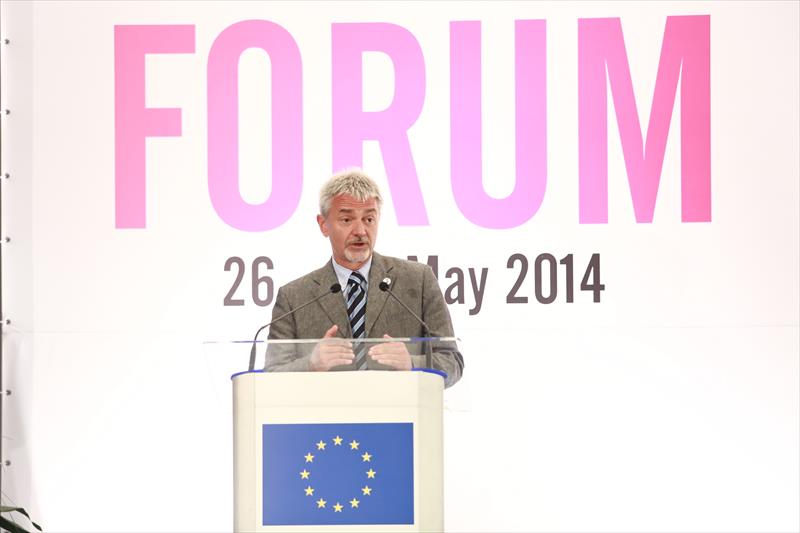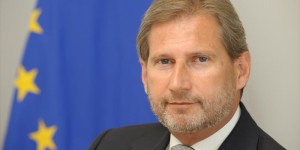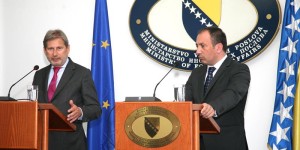What are the greatest successes and the biggest failures during Peter Sorensen’s mandate in BiH?
The key thing is to look at the EU-BiH relationship overall and the collective work – that of the whole EU team here and also the BiH institutions.
We have a very deep bilateral relationship: the EU is the biggest source of financial assistance to Bosnia and Herzegovina and our office is implementing it. Since September 2011, we have signed 422 contracts for projects worth just under 300 million Euro in total; 202 contracts totalling nearly 231 million Euro are currently under implementation.
There’s been a wide range of issues coming over the desk in the past three years. However, following the devastating floods that hit the country in May, our office has in particular put a great deal of effort into dealing with the emergency and the aftermath.
The European Union of course responded immediately through the Civil Protection Mechanism. It was the largest operation since the creation of the Mechanism with 3,000 people rescued and 23 EU Member States offering assistance including motor boats, firefighters, helicopters, pumps and a lot more. Approximately 800 relief workers were deployed to Bosnia and Herzegovina and Serbia during the emergency operations.
Now we are implementing the EU programme for flood recovery worth 42 million Euro and I am very pleased with how it is going – and how fast it is going. The programme will rehabilitate 4,000 dwellings – for approximately 14,000 people – 100 local roads and bridges, 90 educational institutions, 10 water and sanitation facilities, three municipality buildings; four Centres for social welfare, and four healthcare facilities. Also in the 24 most affected municipalities, grants will be made to small and medium enterprises to help them restart activity, retaining around 2,000 jobs.
As we see right now, it is very regrettable that despite years of advice and funds from the EU, Bosnia and Herzegovina has not established the necessary standards to export animal products such as dairy to the EU – including implementing official controls and ensuring an efficient exchange of information within the control chain. This can be fixed by the authorities and should be fixed urgently.
Obviously, we all hoped that Bosnia and Herzegovina would be further on in the EU integration process than it is. But it takes two to tango! I hope that the current stalemate can be addressed by the new authorities of Bosnia and Herzegovina swiftly.
Are Bosnian leaders ready for the fulfillment of the economic conditions, economic measures and the implementation of the Plan on employment?
It’s clear that citizens of Bosnia and Herzegovina are losing patience. Protests across the country were a clear signal of that and I believe everyone, including the BiH politicians, is aware of the urgency. In the election campaign political parties did, I think, focus on economic issues more than before.
Keeping the focus on economic and employment issues is why we are supporting, with the Norwegian Embassy, an Education and Employment Fair in Zenica on Friday. We hope it will be a way for those excluded from the economy to see what opportunities there might be for them.
Some clear decisions will need to be taken regarding the economy. In July, experts, international organisations and citizens spelt out concretely in the Compact for Jobs and Growth what they think should be done to get the economy moving: reduce taxation on work to make it less of a burden to employ new workers; increase openness and competition in the labour market to make it easier for young people and unemployed people to find work – and to ensure hard work pays off; slash the requirements for and time taken to start a business; pass an improved insolvency framework so businesses can be restructured faster; produce clear, public e-registers of procedures for licences and permits; reduce the amount of privileged pensions, and raise social assistance for those who really need it.
All this is designed to help citizens of Bosnia and Herzegovina get a better standard of living. That has also been recognised in the recent Germany-UK initiative for Bosnia and Herzegovina, the Compact for Jobs and Growth holds a prominent position within that. Now it’s down to the country’s politicians to act.
Initiative of Germany and UK also includes signing of promises to implement reforms. Is there a way to punish the irresponsible leaders even if they sign a promise to fulfill the obligations?
Officials or not, everyone should honour what he or she has signed! It’s very important that after the recent elections, Bosnia and Herzegovina should not remain in a stalemate.
Talking about ‘punishments’ at this stage is not so helpful. Right now, a new spirit is needed to effectively deal with reforms, which are the key not only for the EU path of the country, but also for meaningful improvements in people’s lives. I think we should focus on what we do want to achieve and combine our efforts to get there.
How much is the greed of BH leaders hindering the progress of the country?
Societies in which ‘the winner takes all’ do not prosper for long, and greed is never good – especially because it’s citizens who end up paying for it.
I’m not going to engage in accusations, rather my analysis would be that there has so far been insufficient political will in BiH to make progress on key issues, especially EU integration. And we see the result. This has to change for everyone’s sake.
The Progress Report shows that the reason for reducing of IPA funds is failure to adopt the mechanism of coordination or strategies at the state level for individual sectors. If by the next Report BiH does not fulfill its obligations will the EU publish the names of those responsible?
The 2014 Progress Report for Bosnia and Herzegovina clearly stated that the efficiency and functioning of the political institutions at all levels of government need to be improved, and a well-functioning coordination mechanism on EU matters should be set up urgently, with the determined participation of everyone.
Due to the lack of country-wide sector strategies, there is currently limited absorption capacity for the efficient use of IPA II-funds in BiH and consequently BiH will not in this situation be able to benefit from EU assistance in all areas.
For the funds available from 2014 – 2020, the process will work differently than before: if BiH has a sector strategy in place it will be able to access EU funds. This is why no overall allocation for Bosnia and Herzegovina was published back in September. Now, how much Bosnia and Herzegovina receives will depend on the authorities having done their homework (i.e. functioning co-ordination mechanisms and country-wide sector strategies in place).
So again I would rather there was now a focus on getting the job done and not on starting a blame game.
How do you comment the fact that experts in BiH cannot escape the shadow of politics and how do you comment the appointment of the political official to the key position at the Development Bank of the FBiH?
The EU has always supported and will always call for merit-based appointments and promotions. Well qualified people produce good results whichever sector we are talking about. I think there are plenty of examples in Bosnia and Herzegovina that bear this out, we don’t need to single out just one.
Overall, there are too many barriers to jobs in Bosnia and Herzegovina. This issue is one of six areas listed in the Compact for Growth. Access to jobs needs to be opened to everybody – especially young people – and the restrictive practices that protect those who already have jobs and ‘freeze’ the employment market need to be broken down.
Bosnia and Herzegovina needs to enact a set of labour market reforms to increase job creation, including by revitalising the process of collective bargaining, reducing the disincentives for hiring and, in particular, promoting inclusion of the young population in the workforce.
How do you comment the fact that the state prosecutor’s office is conducting an investigation against unknown persons for obstructing the implementation of the Sejdic- Finci case?
That’s a matter for the BiH Prosecutor’s Office.
How do you comment the Mostar case? Is there a possibility for citizens to make decisions about the City and not to let the fate of the City stay solely in the hands of political parties, who will solve the problems on the higher levels at the expense of the Mostar and its citizens?
Mostar is about to enter a third year with no city council and this is completely unacceptable. This situation is a clear violation of civil rights and democratic principles. This has a negative impact on Mostar’s citizens first and foremost, but the violation of European norms also compromises the whole of BiH on its road to EU membership. Mostar’s economic development is also undermined by the political stalemate. Instead of doing all they can to attract investments, create jobs and raise living standards, the main political parties in Mostar seem content to let this unacceptable situation drag on indefinitely. The citizens of Mostar have put up with enough and deserve better.
We expect the political parties to implement the Constitutional Court ruling on Mostar, so local elections can be held as a matter of urgency. Citizens and civil society also have an important role to play. The EU provides ongoing support to non-governmental groups to increase their capacity to be a partner in political dialogue. It is also vital that we hear the voice of businesses and other professional groups. They can best articulate the ways in which their job is made harder by the political stalemate. Politicians in the city are experts in blaming the “other side” for the city’s problems. I think citizens are fed up of this story and will now demand that politicians sit down together and reach compromise in the interests of everyone.
Why the international community ”washes its hands” on the Mostar case?
I can understand that people are frustrated that Mostar remains in limbo. However, the European Union has not abandoned Mostar. The EU has invested significantly in Mostar’s development and reconstruction since the war. Despite a political situation that discourages investments, we continue to implement several important projects in the city that will improve the lives of citizens. We contributed 2.3 million Euro to the construction of a new landfill for the city, including state-of-the-art recycling facilities. Some 8 million Euro of our funds are being spent on a waste water management project that will clean up the river Neretva, and connect several urban areas to a proper sewage system for the first time. We are also focused on job creation: we recently funded a study to help develop the huge potential of Mostar airport, and Mostar has also been selected to participate in a 1.3 million Euro EU project supporting SME development.
These are just some of the projects supported by the EU and our member-states in Mostar. We will continue to invest in Mostar but we need counterparts in local government who can work with us on the development of the city. This is why the international community remains united in its position that an agreement between the parties should be found in time to hold elections in Mostar as soon as possible.
Is the European Union defeated and can we say that human rights are not the primary problem, since conditions are now moved from the Sejdic-Finci case to the economic problems?
No. The approach presented by Germany and the UK in Berlin is about the sequencing and the timing of the steps on the EU path – but the steps themselves remain the same. It does not alter the conditions of accession to the European Union and it is not about lowering standards.
If Bosnia and Herzegovina is to join the European Union, and to enjoy the benefits of membership, then it will have to fulfil the conditions of membership that apply to all future members. This still includes addressing the issue of minority rights highlighted in the Sejdić-Finci case.
The current proposal reflects that there are lots of other important political, social and economic reforms which also need to be done, and may be deliverable earlier. The reforms sought are ones which would have a practical, positive impact on people across the country. They are reforms for the many, not for the few – creating new jobs in the private sector in order to help slow the exodus of the young, offering new opportunities for wealth creation.
How do you comment on a post-election coalition, and the ability to set the platform on the political scene again, which could, as the one from the previous mandate, again downgrade BiH and slow down its progress?
Composition of the future authorities is obviously a matter for the political parties according to the due procedures. However, we hope that all authorities can be formed as quickly as possible to tackle the main issues of concern to citizens such as unemployment and fighting corruption.
Does the European Union have plan B for Bosnia and Herzegovina?
Bosnia and Herzegovina held democratic elections last month, and when new authorities are in place it is their plans that should be of highest interest.
As for the relationship with the European Union, the EU accession path is the only plan. Governments change, but what doesn’t is that the way to the European Union is through reforms that assist BiH in reaching the standard of governance and economic development of EU Member States.
The international community is not about imposing anything on BiH – those days have gone. Laws and decisions in BiH will not be made by international fiat, we want your new government to lead, and we will support those who set a path for a better future.
Citizens of Bosnia and Herzegovina want a better life, they want jobs and they want their country in the European Union. That is want we want too.




